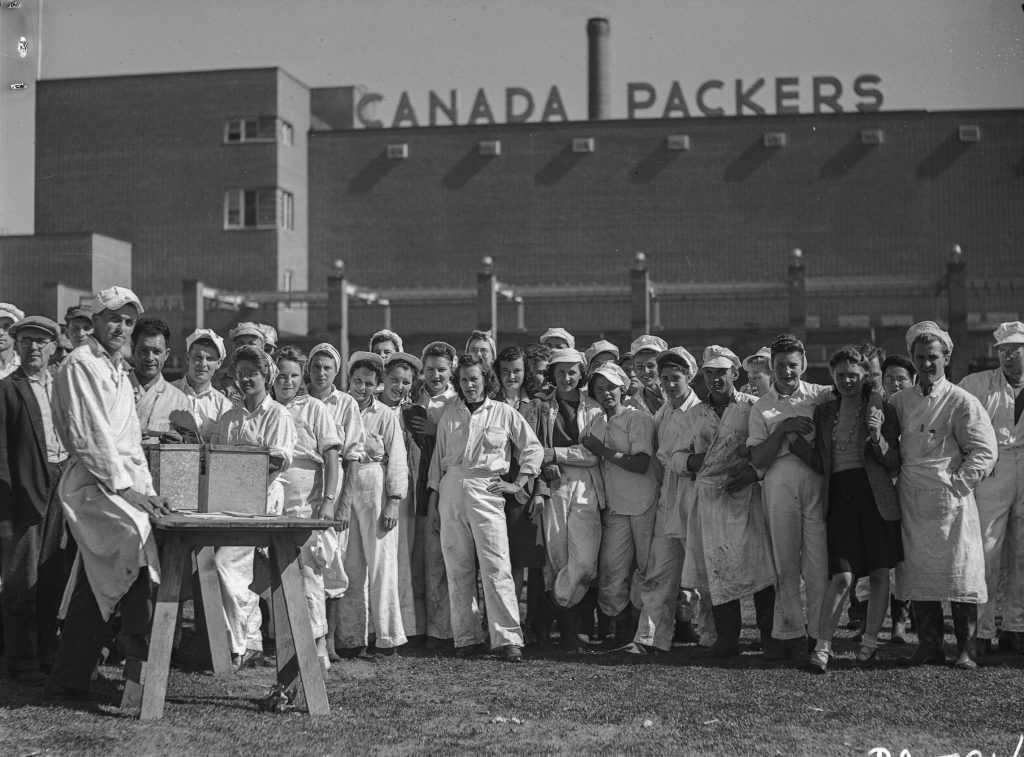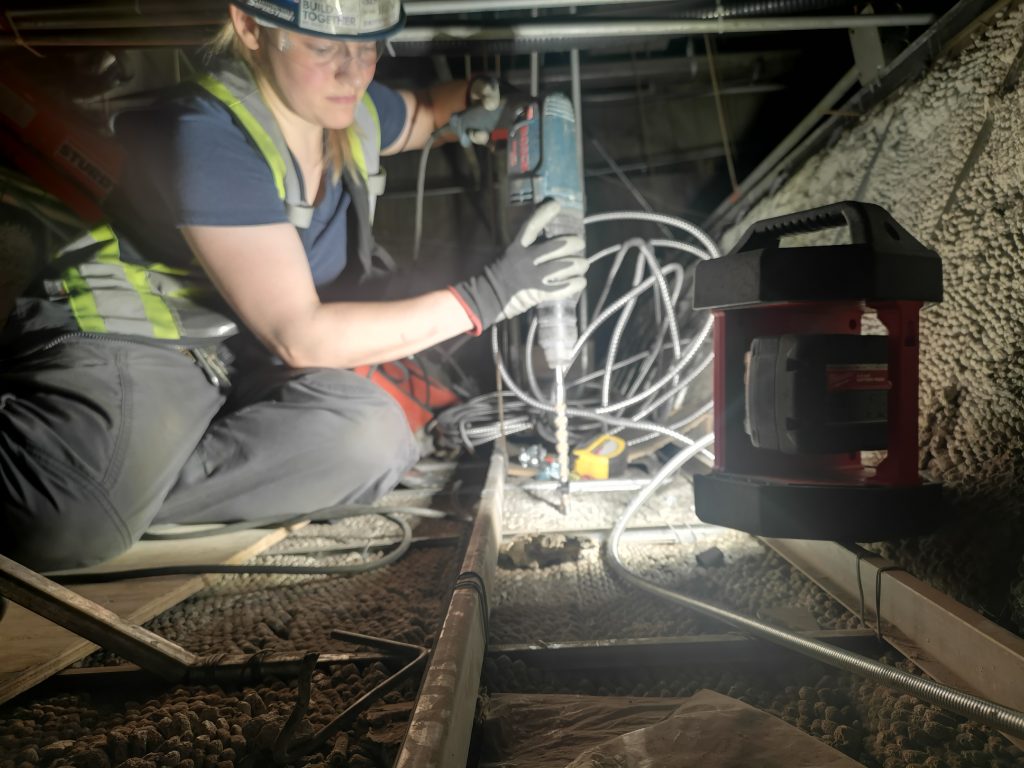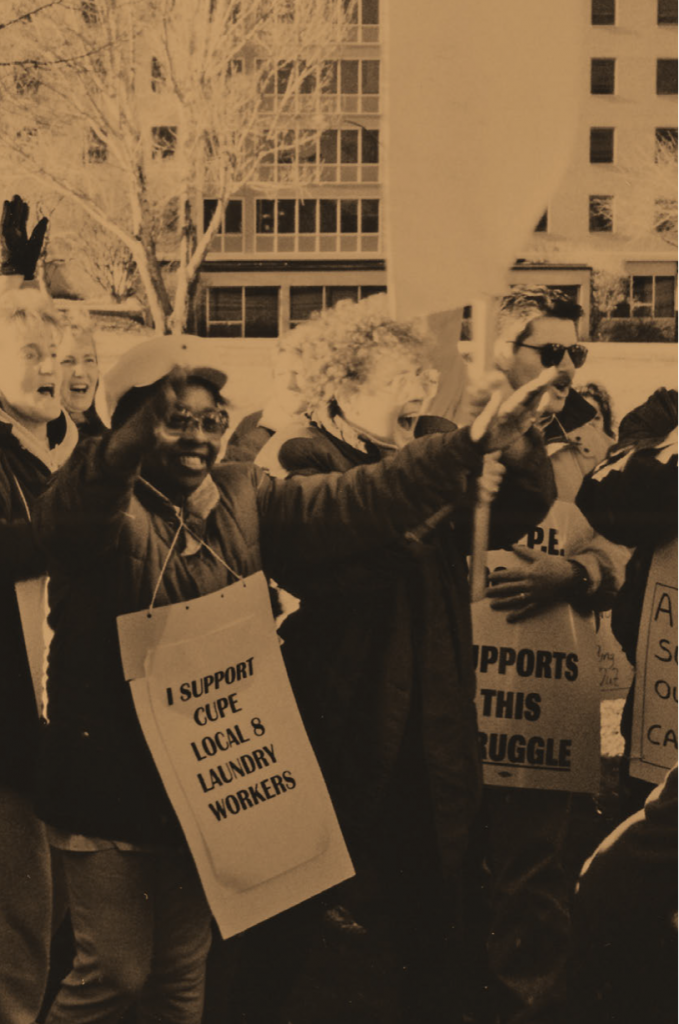
}
Union vote after slowdown strike, Edmonton (Photo: 1944 PAA: BL791.1)

Robyn Schaapman, journeyperson electrician (Photo: ALHI collection)

Calgary laundry workers strike 1995 (Photo: ALHI collection)
March 8 is International Women’s Day (IWD). Although Women’s History Month is marked in Canada in October, March is celebrated as Women’s History Month in the EU, the UK, the US, and in other countries. The Alberta Labour History Institute (ALHI) honours the work of women in Alberta – both in the paid workforce and in contexts where the work has been unpaid, such as caregiving to young children, to family members with disabilities and to aging family members. The experiences, achievements, barriers, challenges, and activism of Alberta women are told through various themes on the ALHI website, and in interviews with women from various communities and who have worked in various workplaces.
IWD has its roots in women’s activism in the early 20th Century for better working conditions and for the vote. The establishment of an annual international women’s day was proposed in 1910 at an International Socialist Women’s Conference in Copenhagen. International Women’s Day was marked for the first time in Austria, Denmark, Germany, and Switzerland, on March 19, 1911. It is now marked around the world as a time to reflect both on gains by women and on barriers and injustices still to be overcome.
Heather Smith, President of United Nurses of Alberta, observes for IWD: “As members of a profession in which women predominate, nurses are particularly conscious of the need to continue the effort everywhere in the world to secure the justice and equality for girls and women that International Women’s Day symbolizes.”
In the early period of the pandemic, before vaccines were widely available, the gender stratification of the job market meant that low-paying service and retail jobs, where women are over-represented, were the ones that disappeared. Meanwhile, in the caring professions, where women also compose a disproportionate share of the work force, the burden of dealing with the fallout of the pandemic exposed the extreme under-staffing in these “women’s jobs” and created exhaustion and anxiety for many women, whose workloads became unbearable while their home responsibilities tended to increase. Racialized and migrant women were the dominant group in the low-paid jobs within the caring sector. While jobs returned as governments decided controversially to abandon pandemic restrictions, the understaffing in caring sectors continued. Continuing outbreaks of COVID along with the return of more common infectious diseases pose challenges for households with children when the children are unable to attend either school or daycare, and it is usually upon women that family care responsibilities fall. Meanwhile the shadow of long COVID hangs over workplaces and households. When women are suffering from long COVID, who takes their place as paid care workers outside their homes and unpaid care workers within?
Sandra Azocar, Executive Vice-President with the Alberta Union of Provincial Employees and a member of the ALHI Board, notes the continued undervaluing of work mostly done by women. “Historically, every time when the world has gone through a major event, it has been an opportunity to re-assess the way we do things. The COVID-19 pandemic has brought a focus on the value we give to work that is important to society. It highlighted the importance of work mostly done by women – in healthcare, education, the public sector. Women have been the face of the pandemic, making sure that society continued to function. But what we have seen is that governments have failed to learn from this event. Women continue to be undervalued, and the increase in domestic violence has not been addressed. Women need to be recognized for the essential services they provide and for their valuable place in society.”
That increase in domestic violence against women has created a dramatic increase in demand on women’s shelters, which are underfunded and provided no salary increases for staff from 2014 to 2023. Meanwhile, in recent years, there have been disturbing increases in reported violence against women in workplaces, perpetrated both by clients and co-workers. Women, particularly racialized women, are also more subject to public violence.
On the severe impact of COVID-19 on women workers, and on the difficult working conditions and undervaluation of work in the long-term care sector, see the reports of the Parkland Institute “A Feminist Approach to Alberta’s COVID-19 Response” and “More than ‘Just a Health-Care Aide’.”
Women’s stories are important components of many of the themes on ALHI’s website:
- Moving Forward – Alberta Women and Work: preserves and honours women’s work in its many contexts and contributions.
- Women in the Skilled Trades: this theme on ALHI’s website features interviews and videos in which the women speak about their jobs and achievements, barriers they have faced, and their contributions to promoting participation of women in the skilled trades.
- Systemic Racism in Alberta’s History: throughout the long history of systemic racism in Alberta, Indigenous peoples, African-Canadians, Asian-Canadians, and Latinos have fought oppression while contributing to the development of Alberta through their labour, their cultural contributions, and their political involvement. Interviews with a number of women who describe their experiences and activism are included in this theme.
- Indigenous Labour History: ALHI’s project to celebrate and explore the work stories of Indigenous people includes interviews with women who describe the racism and other barriers they faced and their activism for the rights of Indigenous workers.
- United Nurses of Alberta: the United Nurses of Alberta represents more than 30,000 Registered Nurses, Registered Psychiatric Nurses, and allied workers in Alberta. In addition to being an effective advocate for nurses and the nursing profession itself, UNA has also been a leader in the fight for a fair and efficient public health care system in Alberta and Canada.
- Women of CUPW: women speak of their work and workplace issues at Canada Post, the history of union activism and strikes, and the formation, activities, and challenges of the CUPW Women’s Committee.
- The 1995 Calgary laundry workers strike: the story of the strike and solidarity actions against the contracting-out of hospital laundry workers’ jobs in Calgary includes a link to an ALHI booklet and interviews with women involved in the events.
- Piece by Piece – the GWG Story: Great West Garments (GWG), established in Edmonton in 1911, employed a significant number of women, reflecting the waves of immigration throughout the 20th Century. Interviews reflect the diverse experiences of women who worked for GWG.
Here are examples of the stories of women and work on ALHI’s website.
- Siobhan Mangal, apprentice in the Operative Plasterers’ and Cement Masons’ International Association, Local 222 and with the Heat & Frost Insulators & Allied Workers, Local 110, and a member of Build Together, Women of the Building Trades.
- Angela Grandbois, a Dene Albertan and journeyperson with over 10 years of experience as a pipefitter-steamfitter and a member of UA Local 488; she recently completed her certification in Power Engineering.
- Karen Craik is the Secretary-Treasurer of the United Nurses of Alberta, a position held since 1996. She has a long history with UNA, from their founding in 1977 to the present day, protecting nurses’ rights and our healthcare system.
- Linda Robinson is a champion for Indigenous and labour rights, and is a strong supporter of the NDP. She has worked for the Alberta Federation of Labour for many years. Raised entirely in foster care, a polio survivor, degree-holder, and grandmother, Robinson has been both a provincial and national representative in wheelchair basketball and is a current curler.
- Kathleen Andrews, the first woman transit operator for the Edmonton Transit System, whose achievements and experiences are described by daughter Lisa Andrews, a transit inspector and member of ATU Local 569.
- Angela Fiddler, a member of the Waterhen Cree Nation, faced racism in oilsands’ work camps and was able, as a shop steward for UFCW Local 401, to bargain for Indigenous rights to worship in the camps.
- Muriel Stanley Venne, a lifelong fighter for human rights and justice for Indigenous women and men, initiated the Native Outreach program for the Métis Nation of Alberta, established the Institute for the Advancement of Aboriginal Women, and chaired the Aboriginal Commission on Human Rights and Justice. We also have a second profile for Muriel Stanley Venne.
- Tarik Accord, Somalia-born, worked in several cleaning firms and was injured on the job at one of them. She helped form a union at Bee Clean and served as a union steward, emphasizing education of members regarding their legal rights in occupational health and safety.
- Yvette Lynch, born in Barbados, worked as a laundry worker at the Calgary General Hospital and participated in the 1995 laundry workers’ strike.
Honouring Alberta Women and Work Webinar held March 19, 2021
